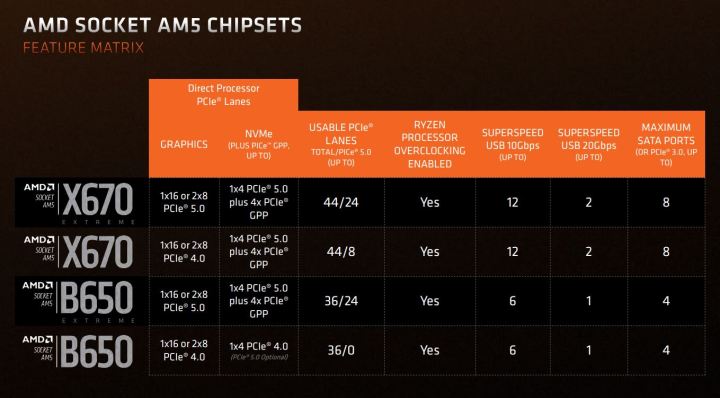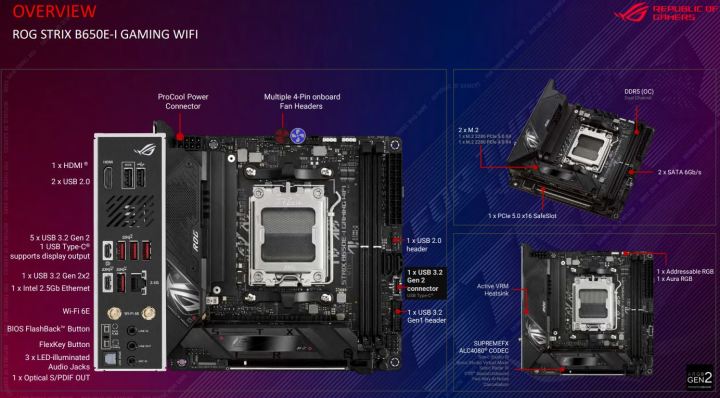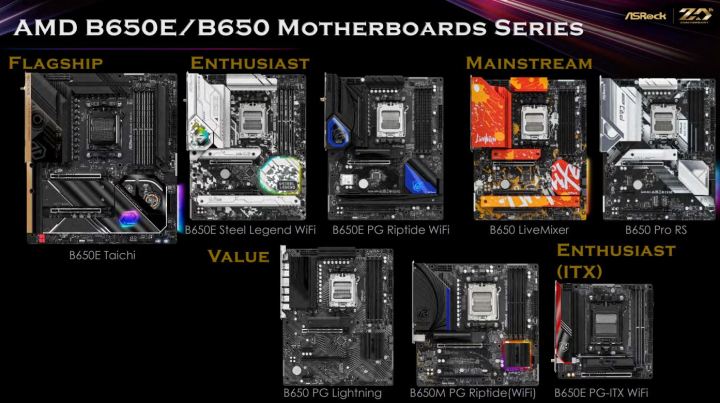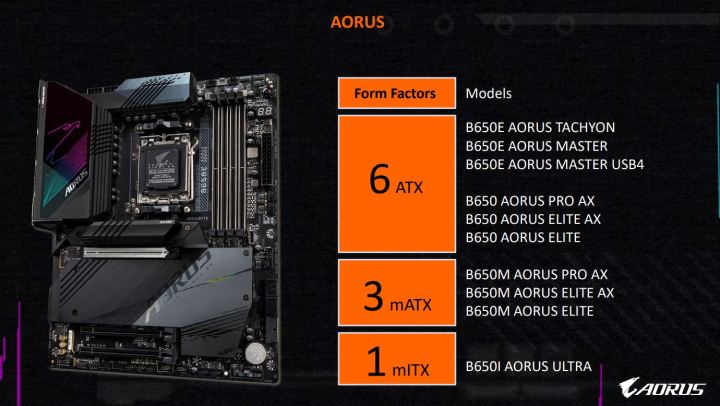AMD and its partners have just unveiled a whole avalanche of budget-friendly B650 and B650E motherboards for the Ryzen 7000 processors. Made for the new AM5 socket, the boards will present an alternative to the already existing high-end X670/X670E.
With motherboards from Asus, ASRock, MSI, Gigabyte, and Biostar set to release shortly, early adopters of AMD Ryzen 7000 will now have a choice between X670 and B650. Let’s see how the two compare.

As we already know, most of the motherboards will be backward-compatible with AM4 socket coolers, but the manufacturers stress that some niche aftermarket solutions may not be supported. Some of the boards will have built-in compatibility and others may require an adapter, so double-check that when you shop. AMD plans to support the AM5 socket through 2025 and maybe even beyond, so the company stressed platform longevity and upgradeability. It’s worth noting that most of the boards offer support for AMD’s own memory overclocking technology (AMD EXPO) while also maintaining support for XMP profiles.

First up, we have Asus, with new entries to the ROG Strix, ProArt, TUF Gaming, and Prime lineups, with options for both ATX and mini-ITX form factors. The ROG Strix B650E-E is the star of the lineup, sporting two PCIe 5.0 x16 slots and two PCIe 5.0 M.2 slots, meaning you can use PCIe 5.0 both for the GPU and for your SSD. There are also two PCIe 4.0 M.2 slots, support for 2.5G Ethernet, and access to Wi-Fi (also present on some of the other boards). For easy installation, Asus added the Q-Release button that releases your GPU, and the M.2 slot also has a toolless design. Lastly, the ROG Strix boards also support Precision Boost Overdrive (PBO) for easy auto-overclocking.

ASRock has eight motherboards coming up, out of which four are of the “Extreme” variety. The flagship is the ASrock B650E Taichi, with a 24+2+1 phase power stage that should carry the overclocking on all Zen 4 CPUs. As a flagship should, it offers PCIe 5.0 support both for graphics and an M.2 SSD, access to a fast USB 4 Type-C port, and Wi-Fi 6E. As seems to be the case with all of these boards, the Ethernet port maxes out at 2.5G. There are also two mATX boards for those who prefer smaller desktops.
Gigabyte also has a full range to choose from. Eight motherboards, including Extreme versions and mATX options, will be coming out soon, spanning the entire Aorus lineup, starting with the flagship Aorus Master, through the Elite and Pro, to the Aero G. The new Gigabyte Aorus Master is the flagship, with the B650E chipset and support for PCIe 5.0 graphics, although you’ll need to take it easy on the PCIe 5.0 SSDs because the bandwidth is shared. The board features plenty of cooling support and overclocking options, with up to DDR5-6600 RAM.

MSI keeps things interesting in terms of design, serving up both pure black motherboards and those with a touch of white for lighter builds. Eight motherboards for gamers are coming up alongside three options for creators. MSI offers up plenty of M.2 slots, up to four on some boards. MSI noted the strength of its new VRM, comparing the B650E to the previous-gen X570, and it touted the fact that even the most entry-level B650 board can easily run the best AMD CPU, the 7950X. The entire lineup supports PCIe 5.0 and DDR5, and DDR5 RAM can be overclocked up to 6600MHz.
Biostar was the last manufacturer to present its new offerings. After a fairly modest (so far) X670 lineup, Biostar has several B650 boards up for grabs, with the flagship Racing B650EGTQ offering support for both PCIe 5.0 graphics and storage, a total of four SATA 3 and three M.2 slots, dual channel memory, Wi-Fi 6E, and 2.5G Ethernet.
The new Zen 4 processors initially launched alongside the enthusiast-grade X670/X670 Extreme motherboards. While these are, certainly, some of the best motherboards for the Ryzen 7000 that we will see in terms of performance, they’re also very expensive, with some boards priced at above $1,000. Fortunately, AMD’s partners are now about to expand their ranges with the B650 and the B650 Extreme, with prices starting at just $125. We don’t yet know the exact prices and release dates for each model, but AMD promised availability during October 2022.



